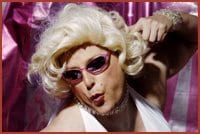In November of 1998, the Pride Committee had a healthy bank balance of more than $35,000, an office housed with Pink Triangle Services, and federally-funded paid employees. The incredible growth of Pride from 1996-1998 was probably not sustainable. The following year, the fundraising goal shrank to $15,000 and overall attendance reportedly declined by 10,000, and only rain insurance kept the committee out of debt in 2000, according to a report in Capital Xtra. By 2001, the Pride Committee had lost its employees and reached a $10,000 shortfall.
The organizers of Pride 2002 executed what at the time Capital Xtra described as “the most successful Pride ever,” for the region. With a party on Bank Street added, attendance was estimated at 55,000 and the Capital Pride website called it “the most successful one-day festival” in the region, “save Canada Day.” Many young people in the queer community list the street party as one of the highlights of their Ottawa Pride experiences.
But the event also left the following year’s committee with a $40,000 deficit. The financial history of Pride has become well known — by 2003, Pride owed $100,000 and by last fall, Pride’s debt had swollen to $200,000 — a number that had been reduced by nearly $70,000 by May of this year.
What does the history of Pride teach us? To some extent, it depends on what lessons you want to learn. For some, the warm stories of early community-based Prides provide a blueprint for a post-big budget queer festival in Ottawa.
“There’s a mix of attitudes among young people,” says Shaun Vollick, administrative coordinator for Carleton’s GLBT Centre. “and for some, a return to a grassroots Pride that isn’t slick or corporate [is what they want].”
For others, the story of the 1994-1995 deficits shows that the gay community tends to respond to crisis. With the threat of Pride being cancelled looming this spring, community members began to take notice. Some older members of the queer community who have not attended in several years are planning to attend this year’s event; meanwhile, the gears are already whirring to plan a rejuvenated Pride 2007.
And for some long-time activists like Carroll Holland, it’s time to re-evaluate the Pride mandate.
“I feel that because of war, AIDS, the disparity between the rich and the poor, it’s time for us now to incorporate our human rights goals into a larger vision, to go beyond our rights — safety, dignity, equality — and to see it as part of a much bigger whole.”


 Why you can trust Xtra
Why you can trust Xtra


